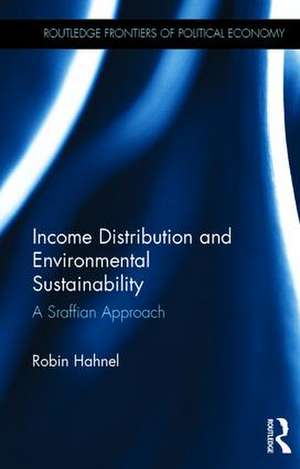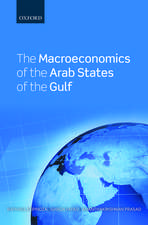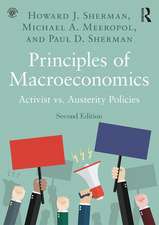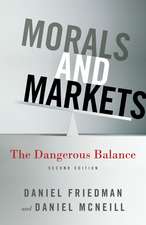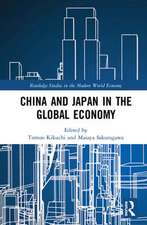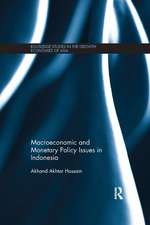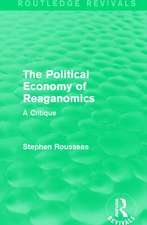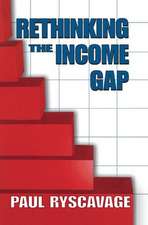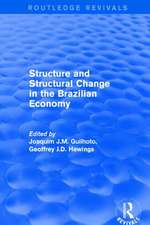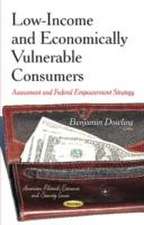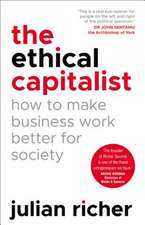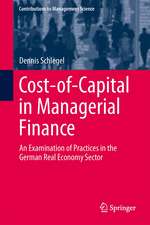Income Distribution and Environmental Sustainability: A Sraffian Approach: Routledge Frontiers of Political Economy
Autor Robin Hahnelen Limba Engleză Hardback – 5 dec 2016
Divided into three chapters, Income Distribution and Environmental Sustainability provides a rigorous exposition of Sraffian theory emphasizing what it means for the economy to be productive, extends Sraffian theory to address environmental sustainability, and adds a normative theory of income distribution to Sraffa’s positive theory. In Chapter 1, a rigorous version of the basic Sraffa model is presented which focuses on what it means for the economy to be capable of producing a physical surplus, explains the origin of profits, and shows how to measure changes in overall labor productivity resulting from any technical change. In Chapter 2, the basic model is extended to incorporate primary inputs from the natural environment, rigorously measure changes in environmental throughput efficiency, and establish sufficient conditions for environmental sustainability. In Chapter 3, an explicit "normative" theory of economic justice is elaborated which is a natural extension of Sraffa’s "positive" theory of income determination and consistent with modern egalitarian literature on distributive justice.
This book is of interest to academics and students who study political economy, economic theory, and philosophy, as well as those interested in the work of Piero Sraffa.
| Toate formatele și edițiile | Preț | Express |
|---|---|---|
| Paperback (1) | 405.66 lei 6-8 săpt. | |
| Taylor & Francis – 27 iul 2018 | 405.66 lei 6-8 săpt. | |
| Hardback (1) | 1103.66 lei 6-8 săpt. | |
| Taylor & Francis – 5 dec 2016 | 1103.66 lei 6-8 săpt. |
Din seria Routledge Frontiers of Political Economy
-
 Preț: 309.90 lei
Preț: 309.90 lei -
 Preț: 309.79 lei
Preț: 309.79 lei -
 Preț: 316.03 lei
Preț: 316.03 lei -
 Preț: 310.95 lei
Preț: 310.95 lei - 9%
 Preț: 866.82 lei
Preț: 866.82 lei -
 Preț: 309.12 lei
Preț: 309.12 lei -
 Preț: 311.61 lei
Preț: 311.61 lei -
 Preț: 286.99 lei
Preț: 286.99 lei -
 Preț: 327.83 lei
Preț: 327.83 lei -
 Preț: 311.87 lei
Preț: 311.87 lei -
 Preț: 302.76 lei
Preț: 302.76 lei - 9%
 Preț: 938.48 lei
Preț: 938.48 lei -
 Preț: 152.67 lei
Preț: 152.67 lei -
 Preț: 151.97 lei
Preț: 151.97 lei -
 Preț: 318.54 lei
Preț: 318.54 lei -
 Preț: 317.95 lei
Preț: 317.95 lei -
 Preț: 310.01 lei
Preț: 310.01 lei -
 Preț: 326.49 lei
Preț: 326.49 lei -
 Preț: 155.44 lei
Preț: 155.44 lei -
 Preț: 309.79 lei
Preț: 309.79 lei -
 Preț: 328.76 lei
Preț: 328.76 lei -
 Preț: 281.72 lei
Preț: 281.72 lei -
 Preț: 286.58 lei
Preț: 286.58 lei -
 Preț: 386.12 lei
Preț: 386.12 lei -
 Preț: 353.78 lei
Preț: 353.78 lei -
 Preț: 325.09 lei
Preț: 325.09 lei -
 Preț: 310.55 lei
Preț: 310.55 lei -
 Preț: 387.03 lei
Preț: 387.03 lei -
 Preț: 324.87 lei
Preț: 324.87 lei -
 Preț: 312.86 lei
Preț: 312.86 lei -
 Preț: 374.16 lei
Preț: 374.16 lei -
 Preț: 329.09 lei
Preț: 329.09 lei -
 Preț: 348.22 lei
Preț: 348.22 lei - 28%
 Preț: 1047.06 lei
Preț: 1047.06 lei - 18%
 Preț: 1169.45 lei
Preț: 1169.45 lei - 18%
 Preț: 1555.17 lei
Preț: 1555.17 lei - 18%
 Preț: 1048.43 lei
Preț: 1048.43 lei - 18%
 Preț: 1059.84 lei
Preț: 1059.84 lei - 31%
 Preț: 767.47 lei
Preț: 767.47 lei - 18%
 Preț: 731.92 lei
Preț: 731.92 lei - 28%
 Preț: 822.54 lei
Preț: 822.54 lei - 18%
 Preț: 1796.21 lei
Preț: 1796.21 lei - 29%
 Preț: 1184.91 lei
Preț: 1184.91 lei - 18%
 Preț: 1120.23 lei
Preț: 1120.23 lei - 15%
 Preț: 700.95 lei
Preț: 700.95 lei - 18%
 Preț: 1116.31 lei
Preț: 1116.31 lei - 25%
 Preț: 299.52 lei
Preț: 299.52 lei
Preț: 1103.66 lei
Preț vechi: 1345.92 lei
-18% Nou
Puncte Express: 1655
Preț estimativ în valută:
211.21€ • 229.34$ • 177.42£
211.21€ • 229.34$ • 177.42£
Carte tipărită la comandă
Livrare economică 23 aprilie-07 mai
Preluare comenzi: 021 569.72.76
Specificații
ISBN-13: 9781138229129
ISBN-10: 1138229121
Pagini: 162
Ilustrații: 9 Line drawings, black and white; 9 Illustrations, black and white
Dimensiuni: 138 x 216 x 15 mm
Greutate: 0.29 kg
Ediția:1
Editura: Taylor & Francis
Colecția Routledge
Seria Routledge Frontiers of Political Economy
Locul publicării:Oxford, United Kingdom
ISBN-10: 1138229121
Pagini: 162
Ilustrații: 9 Line drawings, black and white; 9 Illustrations, black and white
Dimensiuni: 138 x 216 x 15 mm
Greutate: 0.29 kg
Ediția:1
Editura: Taylor & Francis
Colecția Routledge
Seria Routledge Frontiers of Political Economy
Locul publicării:Oxford, United Kingdom
Public țintă
Postgraduate and UndergraduateCuprins
INTRODUCTION
PART 1: SRAFFA AFTER FROBENIUS-PERRON
1.0 Introduction to Part One
1.1 Mathematical Notation, Definitions, and Theorems
1.2 The Dominant Eigenvalue and Right Eigenvector of the Economy
1.3 A Subsistence Economy
1.4 A Productive Economy
1.5 Division of the Net Product
1.6 Basic and Non-Basic Industries
1.7 Technical Change and the Rate of Profit
1.8 Technical Change and Social Efficiency
1.9 Resolving a Conundrum
1.10 Measuring Increases in Labor Productivity
Appendix A: Proofs of Mathematical Theorems.
PART 2: ENVIRONMENTAL SUSTAINABILITY IN A SRAFFA MODEL
2.0 Introduction to Part Two
2.1 Price and Income Determination with Multiple Primary Inputs
2.2 Measuring Environmental Throughput
2.3 Measuring Increases in Throughput Efficiency
2.4 Defining Environmental Sustainability
2.5 Implications for Steady-State and De-Growth Economics
2.6 Generalizing to Heterogeneous Nature
2.7 When Time Matters
PART 3: PRODUCERS AND PARASITES
3.0 Introduction to Part Three
3.1 It’s the Economy that’s Productive, Stupid!
3.2 The Prima Facie Case that Capitalists and Rentiers are Parasites
3.3 Arguments in Defense of Profits and Rents
3.4 What Counts: Contribution or Sacrifice?
3.5 Guilty, as Charged!
Appendix B: Reward for Effort and Modern Theories of Distributive Justice.
CONCLUSION
PART 1: SRAFFA AFTER FROBENIUS-PERRON
1.0 Introduction to Part One
1.1 Mathematical Notation, Definitions, and Theorems
1.2 The Dominant Eigenvalue and Right Eigenvector of the Economy
1.3 A Subsistence Economy
1.4 A Productive Economy
1.5 Division of the Net Product
1.6 Basic and Non-Basic Industries
1.7 Technical Change and the Rate of Profit
1.8 Technical Change and Social Efficiency
1.9 Resolving a Conundrum
1.10 Measuring Increases in Labor Productivity
Appendix A: Proofs of Mathematical Theorems.
PART 2: ENVIRONMENTAL SUSTAINABILITY IN A SRAFFA MODEL
2.0 Introduction to Part Two
2.1 Price and Income Determination with Multiple Primary Inputs
2.2 Measuring Environmental Throughput
2.3 Measuring Increases in Throughput Efficiency
2.4 Defining Environmental Sustainability
2.5 Implications for Steady-State and De-Growth Economics
2.6 Generalizing to Heterogeneous Nature
2.7 When Time Matters
PART 3: PRODUCERS AND PARASITES
3.0 Introduction to Part Three
3.1 It’s the Economy that’s Productive, Stupid!
3.2 The Prima Facie Case that Capitalists and Rentiers are Parasites
3.3 Arguments in Defense of Profits and Rents
3.4 What Counts: Contribution or Sacrifice?
3.5 Guilty, as Charged!
Appendix B: Reward for Effort and Modern Theories of Distributive Justice.
CONCLUSION
Recenzii
‘Any economics that does not deal forthrightly with economic inequality is no longer suitable for the twenty-first century. Similarly, any economics which does not provide a coherent way to integrate environmental sustainability into economic analysis will fail to command allegiance in the century ahead. This book demonstrates how the Sraffian framework provides important advantages in both areas.’ — www.urpe.org (February 16, 2017)
Descriere
This book demonstrates how the Sraffian framework provides important advantages in treating both subjects. Split into three parts Income Distribution and Environmental Sustainability provides a rigorous exposition of Sraffian theory emphasizing what it means for the economy to be productive, adding a normative theory of income distribution to Sraffa’s positive theory.
